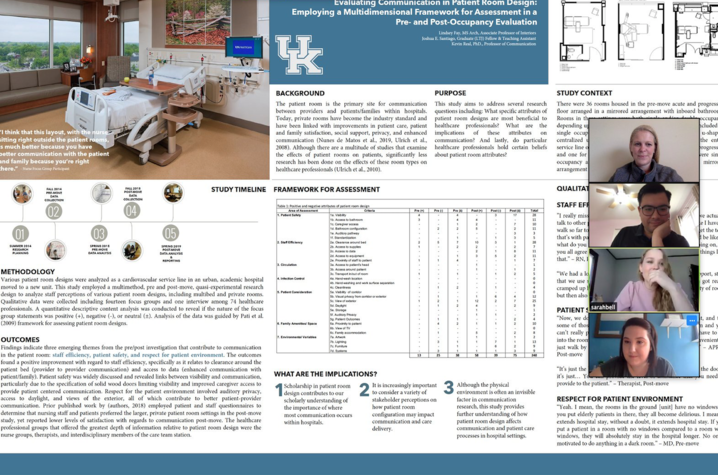Kentucky Conference on Health Communication Goes Virtual Amid Global Pandemic

LEXINGTON, Ky. (May 5, 2020) — The Kentucky Conference on Health Communication (KCHC), which was supposed to be held April 2-4, 2020, at the Hyatt Regency in Lexington, made the swift change to a virtual conference amid the COVID-19 pandemic.
KCHC 2020 focused on intersectionality and interdisciplinarity in health communication research. Despite challenges faced globally, the 2020 conference accommodated 280 attendees, 200 presenters and included representation from 115 organizations, 31 states and nine countries.
“We had the whole conference planned and ready to go when it became clear that an in-person conference would not be possible. We made the decision to go virtual on March 7 and went live on April 2. I’m just lucky to have an amazing technology staff, especially our department’s Director of Research and Instructional Technology Scott Johnson,” said Nancy Harrington, KCHC director and associate dean for research in the University of Kentucky College of Communication and Information.
Hosted by UK CI's Department of Communication, this biennial conference promotes health communication research and discusses health communication challenges. This year, however, this discussion format looked atypical.
KCHC 2020 adapted to be held on Zoom, a screen-sharing and virtual presentation software that is now being used across the country to hold classes and meetings as the COVID-19 pandemic keeps people sheltered at home, away from schools and offices. Participants in the conference were able to interact with presenters live to participate in scholarly discussions and presentations.
Daniel O’Keefe, professor in the Department of Communication Studies at Northwestern University, claims that KCHC 2020 has set the bar high for virtual events in the future.
“The conference itself was a model for how to do online conference. I’m sure the International Communication Association will be doing their best to manage the complexities of such a large event scheduled for a time zone distant from so many participants, but KCHC has set the bar,” said O’Keefe.
Even though social distancing inhibited convening in-person, the keynote, other invited speakers and paper and poster presenters were able to share their works with the health communication community via presentations through Zoom.
Katharine Head, who earned her doctorate in communication at UK, also commends the conference for adapting so quickly. “I have to say, I was amazed at the strong quality of the conference in the virtual space, and I'm grateful to Dr. Harrington, Scott Johnson and the rest of the KCHC team for putting such thought and hard work into making sure the usual high caliber of the conference was translated into this online platform. With a few minor tech glitches, which, let's face it, is the norm in most of our worlds these days, the conference experience was seamless, and the quality of the work shone through,” Head said.
Head aided in the planning of KCHC and now serves on the KCHC External Advisory Board.
As the state’s flagship, land-grant institution, the University of Kentucky exists to advance the Commonwealth. We do that by preparing the next generation of leaders — placing students at the heart of everything we do — and transforming the lives of Kentuckians through education, research and creative work, service and health care. We pride ourselves on being a catalyst for breakthroughs and a force for healing, a place where ingenuity unfolds. It's all made possible by our people — visionaries, disruptors and pioneers — who make up 200 academic programs, a $476.5 million research and development enterprise and a world-class medical center, all on one campus.




